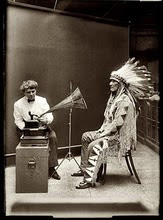
"Watch yer mouth, son!"
Next week, when President Obama arrives in Beijing, he will represent a nation that maintains "positive, cooperative and comprehensive" ties with the Middle Kingdom (the official jointly-agreed-upon characterization in Beijing and the Beltway).
This is in marked difference to the Nixon-era "tacit allies [against the Soviet Union]" and the George W. Bush-era "strategic competitors." Bush had also described the relationship as "candid," but Beijing has shied away from suggestions that the two powers might criticize each other publicly.
Don't rush to cynicism—this Confucian-inspired attitude reflects the existential importance of face-saving and respect between two mutually-dependent behemoths. He is recorded in the Analects 2,500 years ago as explaining the importance of language to statecraft:
There must be no arbitrariness in what is said. This matters above all things. If names are not correct, language is not in accordance with the truth of things. If language is not in accordance with the truth of things, affairs cannot be carried to success.

What words will President Obama, known above all things for his rhetorical flourishes, use next week? Town hall-style meetings have presented the administration with some of its toughest domestic criticism over fiscal policy and health care reform. What happens 7,000 miles away, when he faces a hot seat in a heavily mediated town hall with students in Shanghai? And what of his steps through the ancient tradition of Forbidden City diplomacy in Beijing, where slight breaches of nuanced ritual have lost many a foreign emissary life and limb?
Perhaps Obama was a little too candid with his words as a young senator in Illinois:
They're neither our enemy, nor our friend. They're competitors.Ouch.
According to Orville Schell, China specialist with the Asia Society's Center on U.S.-China Relations, "We Americans don't do ritual very well. We don't take it seriously. For the Chinese, it is all-important."
Perhaps it would be indeed be prudent to parse our words toward a "strategic competitor" which holds $1 trillion in American debt; which is our most important trading partner; which maintains a nuclear stockpile of hundreds and the world's largest army; which maintains intimate ties with trouble spots North Korea, Pakistan, Iran and Sudan; which has held crucial veto power on the U.N. Security Council since 1979; and which may likely eclipse us in economic and geostrategic power within our lifetimes.

The Gossip, by Norman Rockwell
Little known fact: It is official U.S. policy since President Nixon signed the Shanghai Communique in 1972 that Taiwan is actually part of the People's Republic of China. There are only 22 (mostly tiny) countries that diplomatically recognize Taiwan as a separate nation—the United States is not one of them. The "Taiwanese Embassy" in the United States is officially known as the "Taipei Economic and Cultural Representative Office in the United States," even though its web domain is "www.taiwanembassy.org/US." Taiwan, which self-identifies as the "Republic of China," is known widely as "Chinese Taipei" in international sporting events (like the 2008 Beijing Olympics) and some international organizations, per People's Republic of China pressure.
From Wikipedia:
Both sides agree to use the English name "Chinese Taipei". This is possible because of the ambiguity of the English word "Chinese". In 1979, the International Olympic Committee passed a resolution in Nagoya, Japan, restoring the rights of the Chinese Olympic Committee within the IOC, meanwhile renaming the Taipei-based Olympic Committee "Chinese Taipei Olympic Committee". Since then, and until 1989 the PRC translated "Chinese Taipei" as "Zhongguo Taipei" (simplified Chinese: 中国台北, traditional Chinese: 中國臺北, hanyu pinyin: Zhōngguó Táiběi), connoting that Taipei is a part of the Chinese state. By contrast, the Republic of China government translated it as "Zhonghua Taipei" (traditional Chinese: 中華台北 or 中華臺北, Hanyu Pinyin: Zhōnghuá Táiběi) in Chinese, which references the term "China" as the cultural or ethnic entity, rather than the state.----------------------------------------------------------------------------------
"If names are not correct, language is not in accordance with the truth of things..."





The popular comment layout is common, so it is easily recognized scanning to post a comment. If the comment section is in a different format, then I am going to spend more time trying to decipher what everything means.
ReplyDeletelatest technology trends